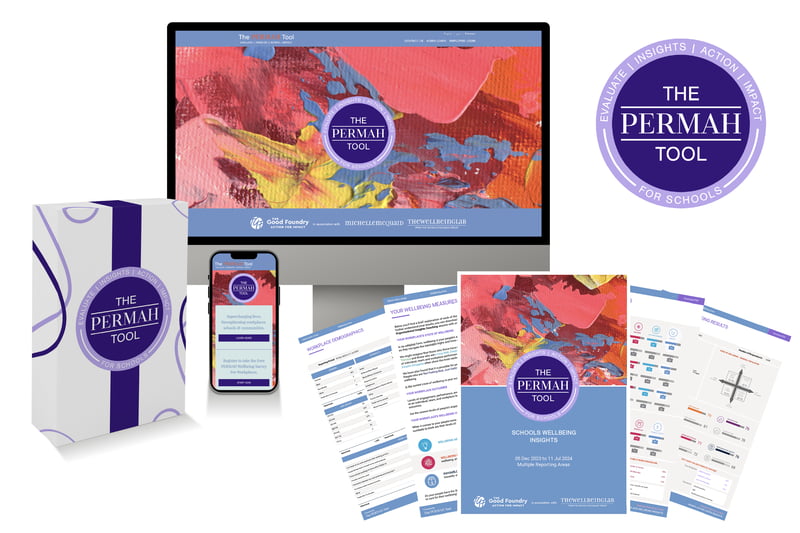


PERMAH Schools Edition
The globally renowned PERMAH Wellbeing Tool is a powerful instrument used by organisations around the world to simplify the complexities of supporting mental health and wellbeing in the workplace.
More than 180,500 PERMAH Tool surveys have been completed across over 1,310 workplaces in 145 countries, and eighty-three percent of survey users report that they would recommend the tool to other workplaces.
Why is the PERMAH Tool so popular? Everything—from the PERMAH Tool questions and results insights to the reports, guides, and additional resources—has been designed through an evidence-informed and strengths-based lens. This approach both normalises struggle and importantly provides users with a highly effective and flexible evidence-based wellbeing toolbox, ready to use. Completely confidential and taking less than five minutes to complete, the PERMAH Tool for Schools provides:
For staff:
- An immediate, easy-to-understand “Wellbeing Insights Results Report” with coaching questions to guide them through their findings.
- The option to create a personalised “Wellbeing Plan” from more than 200 evidence-based workplace wellbeing nudges, if they wish.
For leaders:
- A de-identified “School Wellbeing Insights Results Report” with actionable insights for their people (“Me” Level), teams (“We” Level), and school (“Us” Level), along with coaching questions to guide leaders through the findings.
- A step-by-step “School Wellbeing Strategy” for leading wellbeing, featuring more than 50 evidence-based team wellbeing activities to try.
The PERMAH Tool for Schools measures:
- State of Workplace Wellbeing: Know where and for whom to prioritise your wellbeing efforts and investments with this simple-but-powerful snapshot that shows you the levels of thriving and struggle across your teams and school.
- School Outcomes: Explore the impact people’s levels of wellbeing may be having on engagement, performance, and satisfaction in your school.
- Wellbeing Amplifiers: Evaluate the effectiveness of your efforts and investments in caring for wellbeing, improving people’s wellbeing abilities, confidence, and safety.
- PERMAH Wellbeing Factors: Understand the strengths of current individual (“Me”), leader and team (“We”), and school (“Us”) actions to care for wellbeing, and identify potential risks or gaps that need to be addressed.
- Workplace Wellbeing Nutrients: Understand the strengths of your school culture in supporting people’s psychological needs for belonging, diversity, mastery, autonomy, job resources, and physical safety, and identify potential risks or gaps that need to be addressed.
- Additional Insights: The top three wellbeing struggles being experienced, the biggest barriers to caring for wellbeing, the people we turn to for help, and the most valued forms of school wellbeing support are captured.
Choose Quantity
You can experience the PERMAH Tool for Schools [HERE].
Want to see samples of the PERMAH Tool for Schools Resources and Reports?
For the Staff Participant:
- Individual Personalised Wellbeing Insights Report
- Individual Personalised Wellbeing Plan Report
- Individual Wellbeing Guide
- Workplace Wellbeing Evaluation Insights
Want to evaluate, develop insights, take action, and have a positive impact in other critical workplace areas? We’ve got you covered.
We offer two optional sets of questions and ready-to-use reports that teams and workplaces can add to the PERMAH Wellbeing Tool if needed:
Psychosocial Risk Assessment Tool:
Identify the frequency, impact on wellbeing, and duration of hazards related to:
- Work Design – Lack of role clarity, unachievable job demands, low job control, inadequate reward and recognition
- Social Support – Lack of supervisor support, poor workplace relationships, bullying, harassment
- Work Experiences – Poor change management, poor physical environment, isolated and remote work
- Work Conditions – Poor organisational justice, violent and aggressive behaviours, traumatic events or materials
Assess the frequency and effectiveness of the support your leaders are providing for their teams regarding each hazard, and evaluate the levels of psychological safety at the individual (“Me”), leader and team (“We”), and workplace (“Us”) levels.
You can experience the Psychological Hazards Risk Assessment Tool by clicking (HERE)
Culture of Safety and CARE Assessment Tool:
Know where and for whom to prioritise your efforts and investments with this simple but powerful snapshot that shows the levels of safety and care across your teams and workplace. Identify the strengths of current individual (“Me”), leader and team (“We”), and workplace (“Us”) actions in expressing compassion, showing appreciation, encouraging responsibility, and demonstrating emotional wisdom. Assess the potential risks or gaps that need to be addressed.
After all, while safety is a workplace requirement, studies continue to find that care is a business imperative.
You can also experience the Culture of Safety & Care Assessment Tool by clicking [HERE].
More about the PERMAH Framework:
In its simplest form, wellbeing is your ability to feel good and function effectively. It provides the resources to navigate the highs and lows we all experience in our work and lives while enabling you to intellectually, emotionally, socially, and physically 'flourish.' Professor Martin Seligman, one of the world’s leading researchers in positive psychology and human flourishing, suggests that wellbeing is cultivated by the presence of:
- Positive emotion – The right balance of heartfelt positivity to boost resilience
- Engagement – The regular development of our strengths – those things we’re good at and enjoy doing
- Relationships – The creation of authentic, energising connections
- Meaning – A sense of connection to something bigger than ourselves
- Accomplishment – The belief and ability to do the things that matter most to us
This framework is often referred to as ‘PERMA.’ Other researchers also believe that cultivating your health through eating well, moving regularly, and sleeping deeply is a hygiene factor of wellbeing. Therefore, Martin’s framework is now often expanded to PERMAH. Just like muscle groups or areas of fitness, these areas of wellbeing can be tested, targeted, and developed through ongoing ‘Positive Interventions.’ Welcome to the PERMAH Tool!
How is the PERMAH Tool for Workplaces Charged?
Just FYI, the PERMAH Tool for Workplaces isn’t charged by participant, like most tools. Instead, you have the option of:
- ONE-TIME unlimited assessment, or
- 3 Months Licence, or
- 6 Month Licence, or
- 12 Month Licence.
